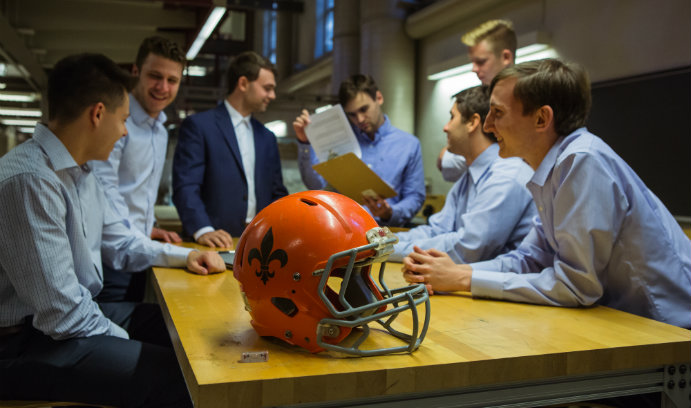Tackling Head Injuries

An IBE team is helping to develop and market a device for recognizing concussive hits in football. From left are Nick Valletta ’18, Bram Robinson ’17, James Fish ’18, Sean Feick ’18, Billy Miya ’18, Mike Trongone '18 and Chris O’Neill ’18. Missing from the photo is Dan Ritter ’18.
Photo: Christa Neu
As concerns mount over football’s concussion crisis, a team of students in Lehigh’s Integrated Business and Engineering program (IBE) is helping to develop and market a mechanical impact sensor that would alert parents, coaches and other players when someone takes a potentially concussive hit.
The team is working with Tozuda, a company founded by Lehigh alum Jessie Garcia ’12 ’13G, who began developing the patented technology while in Lehigh’s Technical Entrepreneurship program. Chris Basilico ’10 ’12G is the company’s chief technology officer.
The device, which attaches to a helmet, measures g-force and turns red if a player sustains a hit above a certain threshold. Competing products are costlier and electronic, team members said.
“If the sensor goes off, it doesn’t mean that you have a concussion, but there’s a high percentage that you do, so you should go get checked further,” said teaching assistant Bram Robinson ’17, who is leading and mentoring the IBE team.
The students—Sean Feick ’18, James Fish ’18, Billy Miya ’18, Chris O’Neill ’18, Mike Trongone ’18, Dan Ritter ’18 and Nick Valletta ’18—have been working with Tozuda since February to try to help the company facilitate its processes. Feick also interned with the company. The students are helping to line up high school and youth football teams to test the device on the playing field. They also are assessing marketing concerns, such as where and how to sell the product, and to whom.
The students, several of whom played football growing up, say interest has been high among coaches as well as parents who worry about their children participating in football and getting injured. Miya, who had suffered concussions when he was younger, said his parents had been reluctant for him to play and would have been more assured with such a device.
“Everybody knows [concussions] are happening, and now everybody’s trying to solve the problem,” said Trongone. “It’s awesome to be on a project that’s solving a problem.”
Participation in youth football has been declining over concerns about concussions, O’Neill and Fish said coaches have told them. The problem has been amplified by news reports of long-term brain damage suffered by professional football players who sustained concussions, and the 2015 film Concussion, which tells the true-life story of a pathologist who discovered a link between football and chronic traumatic encephalopathy (CTE).
“It strikes a chord with people because they know something like this [device] is needed,” O’Neill said.
The students will present their final recommendations to Tozuda at the end of the fall 2017 semester.
Posted on:




